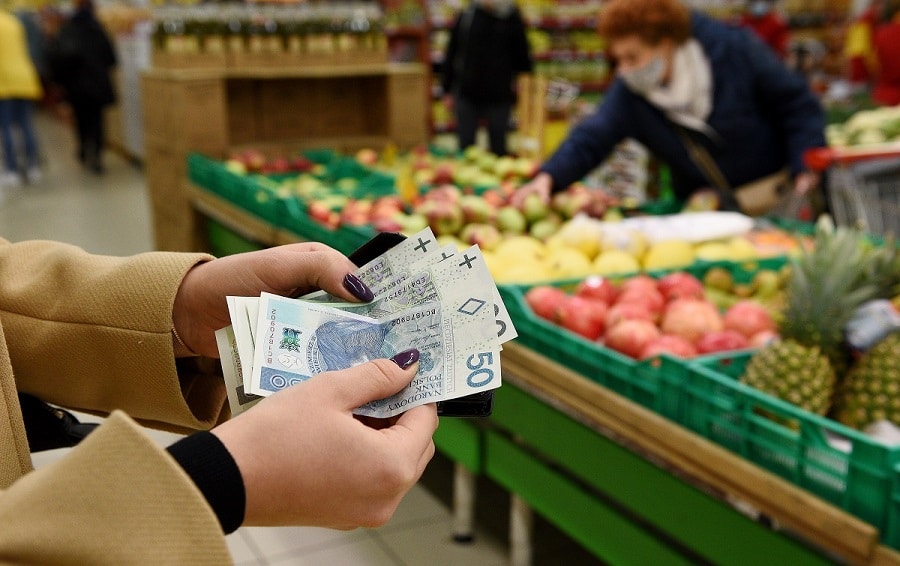Prices in stores will continue to rise. The worst period awaits Poles next year. Inflation could reach up to 10%.
The dynamic of price increases in stores is successively growing. In July, everyday purchases were on average 3.9% more expensive than a year before, in June – by 3.1%, in May – by 2.9%, and in April – by 2.4%. The authors of the mentioned analysis are certain that this upward trend will not cease. They also forecast that the general level of inflation will rise to around 5% in December, and may potentially reach 10% next year. Various worst-case scenarios could ultimately contribute to this. New factors keep appearing that increase the operational costs of stores and manufacturers. Hence, the price war in the market is becoming less and less protective of customers’ wallets. Additionally, the risk of rising energy bills and the danger of another minimum wage increase could push up retail prices.
In July, everyday purchases were on average 3.9% more expensive than a year before. This was demonstrated by the report titled “RETAIL STORE PRICE INDEX”, periodically published for nearly 7 years by UCE RESEARCH and WSB Merito University, based on the analysis of 69.1 thousand prices in 31.8 thousand retail stores. Results from the past few months show that the dynamic of price increases is consistently growing. In June, the year-on-year increase – calculated using the same methodology – was 3.1%, in May – 2.9%, and in April – 2.4%.
“The return of the upward trend was forecasted from the very beginning of the year. It will also be visible in the following months. I predict that inflation may reach 5% in December hence prices in stores will continue to rise. In 2025 we might be dealing with a further increase in the inflation level, i.e. in the range of 7-10%. This will be caused by, for example, the increase in energy prices, gas, fuels and services, the raising of distribution fees and the increase in network heat” – believes Dr. Sławomir Jankiewicz, Prof. UWSB Merito.
Additionally, the expert warns that the number of people at risk of poverty may increase next year. – We are threatened by many worst-case scenarios, which if realized, will affect prices in stores. If, for example, military operations are intensified in Ukraine or the Middle East, or if the US economy encounters problems, our consumers will certainly feel it. On the other hand, in the country, factors such as the lack of restructuring of large state enterprises and problems with financing excessive debt and rising energy prices may indirectly cause inflation – adds Dr. Sławomir Jankiewicz.
Until recently, the market was saying that because of the price war among discount stores, in the following months, after unblocking the VAT prices would slowly return to normal. However, co-authors of the research from UCE RESEARCH believe that their increase at the mentioned rate is inevitable. “The impact of the VAT thaw on retail store prices was – as expected – postponed. In the initial period, the retail chains indeed took on part of the tax themselves, but the full transfer of the thawing VAT costs onto customers was only a matter of time and that’s what’s happening now,” emphasizes Dr. Tomasz Kopyściański from WSB Merito University.
As Dr. Kopyściański points out, the intense competitive battle of retail chains does indeed reduce the perceived prices in stores somewhat, but prices are nonetheless rising. Additional factors have appeared that are increasing store operating costs, for example, the second minimum wage increase this year. A similar opinion is expressed by another expert. – Discounts decided to take over part of the VAT increase through reducing margins. They are currently raising them back to the original level, which is causing price increases – explains Dr. Sławomir Jankiewicz.
Data collected also shows that in July, 11 out of 17 monitored categories showed a single-digit year-on-year increase (in June and May – 12). Recently, 2 groups of goods recorded a double-digit increase (in two previous months – 1). Additionally, 4 categories recorded a decrease in July (in June and May – the same).
Unfortunately, in the following months, there is a high probability that additional product categories will show a price increase. They are likely to be single-digit jumps. The market situation will be influenced by growing demand pressure. In July salaries rose by almost 11% year-on-year, leading to an increase in real purchasing opportunities for consumers against single-digit inflation. Stores also want to benefit from this. In the long term, prices may be even 6-7% higher year-on-year due to the risk of rising energy bills and the threat of another minimum wage increase from January 2025,- sums up Dr. Tomasz Kopyściański.
Source: https://ceo.com.pl/ceny-w-sklepach-beda-rosly-inflacja-w-2025-r-moze-dojsc-do-10-46943
